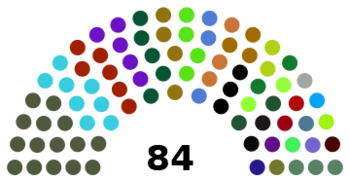Federal Senate of Brazil (Pax Brasiliana)
Federal Senate Senado Federal (Portuguese) | |
|---|---|
| Type | |
| Type | |
Term limits | None |
| History | |
| Founded | 6 May 1826 |
New session started | 1 October 2021 |
| Leadership | |
President of the Federal Senate | Lauro Wolff, LIGA-RG since 8 August 2022 |
Second President | Mauro Carlos de Barros, PSP-SV since 8 August 2022 |
Third President | Priscila Maciel, PTN-RM since 8 August 2022 |
| Structure | |
| Seats | 87 |
 | |
Political groups | Government (54)
|
Length of term | 4 years |
| Salary | R$ 52,532 (and benefits) |
| Elections | |
| Plurality at-large voting | |
Last election | 4 December 2022 |
Next election | 28 June 2026 |
The Federal Senate (Portuguese: Senado Federal) is the upper house of the Federal Parliament of Brazil. It was created during the Empire of Brazil by Emperor Dom Pedro I. Initially based on the British House of Lords, it switched to a system similiar to that of the United States Senate with the constitution of 1895. Since the 1997 Brazilian Revolution, Brazil has been a parliamentary democracy. The Federal Senate has 87 seats. Each of the 29 federative units (28 states and the Federal District) is represented by three senators. There is no term limit, although the Federal Senate is renewed every four years at the Brazilian General elections.
The current president of the Federal Senate is Lauro Wolff, a member of the National Reorganization League. He represents the state of Rio Grande and was appointed to the presidency of the Senate by Minister-President Verônica Giraud on 8 August 2022 amidst the 2022 Brazilian Political Crisis
Membership
The Federal Senate has 87 members, serving a four-year term of office. There are three senators from each of the country's 28 states, plus the Federal District. The most recent election was on 1 October 2021.
Electoral System
The 87 senators of the Federal Senate are elected through a plurality at-large voting system, in which the three most voted candidates of a single constituency are elected.
History
The Federal Senate of Brazil was first established as the Senate of the Empire by the Brazilian Constitution of 1824 and was inspired by the British House of Lords.
Upon its creation, the Senate served as a consulting body for the monarch. Membership was for life and was a place of great prestige, to which only a tiny fraction of the population could aspire. The number of Senators was proportional to the provinces' population. The Senators were elected, but they had to be at least 40 years old and have an annual income of 800,000 contos-de-réis, which meant only extremely wealthy citizens could become senators. Voters also faced income qualifications. The unelected Princes of the Brazilian Imperial House were senators by birth and would assume their seats in the Senate upon reaching the age of 25.
Following the Brazilian Civil War (1889-1894), Universal suffrage was adopted, although it was limited to the literate, which meant that most Brazilians were disqualified from the right to vote. During the 1930s Electoral Reforms, women, low-ranking military officers, the clergy, and the illiterate were given the right to vote.
The modern Federal Senate resembles the United States Senate in that each federative unit (or state) has the same number of senators.
Standing committees
| Committee | Chair |
|---|---|
| Agriculture and Fishing | Walmir Martins (LIGA-TU) |
| Constitutionionality and Justice | Rodrigo Mota (UDN-IL) |
| Culture and Sports | Mário Barroso (PTN-PA) |
| Economic Affairs | Fernando Fortunato (LEGIÃO-GU) |
| Education | Marlise Garcia (LIGA-RG) |
| Environment | Roberto Batista da Silva (PAN-DF) |
| Ethics and Parliamentary Decorum | Fabrício Ritter (LIGA-SL) |
| Federalism | Larissa de Araújo (PTN-AR) |
| Foreign Affairs | Roberto Damas (LIGA-CL) |
| Infrastructure | Paulo Santos (LIGA-IT) |
| National Defence | Valdemir Souto (UDN-LA) |
| Public Security | Rebeca Wisniewski (LIGA-PR) |
| Science, Technology, Innovation, Communication and Computing | Ricardo Brasil Urbano (PNT-IG) |
| Social Affairs | Waldir Magno (LIGA-DF) |